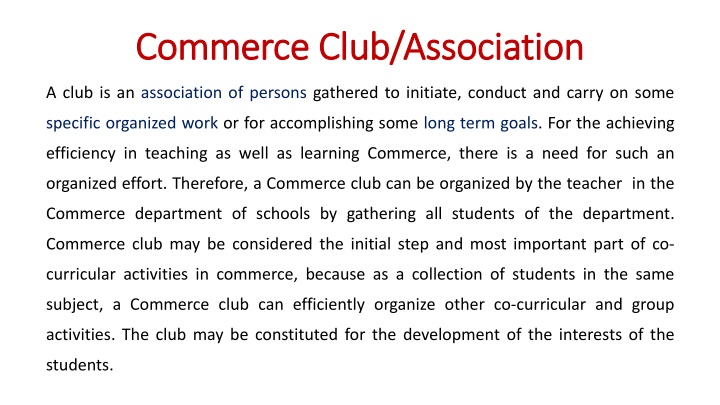The Presidency Department of Performance Monitoring and Evaluation in South Africa
This presentation highlights the establishment, timeline, and importance of evaluation systems in South Africa, focusing on the Department of Performance Monitoring and Evaluation. It covers aspects such as the National Evaluation System, reasons for evaluation, scope of evaluation policy framework, and the evolution of evaluation practices over the years.
Download Presentation

Please find below an Image/Link to download the presentation.
The content on the website is provided AS IS for your information and personal use only. It may not be sold, licensed, or shared on other websites without obtaining consent from the author.If you encounter any issues during the download, it is possible that the publisher has removed the file from their server.
You are allowed to download the files provided on this website for personal or commercial use, subject to the condition that they are used lawfully. All files are the property of their respective owners.
The content on the website is provided AS IS for your information and personal use only. It may not be sold, licensed, or shared on other websites without obtaining consent from the author.
E N D
Presentation Transcript
Commerce Club/Association Commerce Club/Association A club is an association of persons gathered to initiate, conduct and carry on some specific organized work or for accomplishing some long term goals. For the achieving efficiency in teaching as well as learning Commerce, there is a need for such an organized effort. Therefore, a Commerce club can be organized by the teacher in the Commerce department of schools by gathering all students of the department. Commerce club may be considered the initial step and most important part of co- curricular activities in commerce, because as a collection of students in the same subject, a Commerce club can efficiently organize other co-curricular and group activities. The club may be constituted for the development of the interests of the students.
Objectives Objectives To provide opportunities for creative activities and for the development of leadership qualities in the students. To help in developing positive outlook towards different occupations To learn public speaking, participation in debates and other literary activities etc. To provides opportunities to the students for enriching their experiences. To supplements the curricular work. To provides the opportunities for the development of pupils abilities. Club is very helpful in making the constructive us of leisure time. Club may help in the exploration of occupational interest of the students. Club provide opportunities for the practice of group planning and decision.
Activities Activities For the improvement of the learning process, Commerce club can organize the following activities under the direction and supervision of teachers: Conduct meetings Tours Organisation of fairs and exhibitions Arranging extension lectures of learned personalities Visit to industries and place of commercial importance Essay competitions Undertaking projects Preparation of model Publish school magazine Market studies and surveys field trips Debate, discussion etc. Running of school bank School cooperative scores
Qualities of teacher in charge Qualities of teacher in charge Teacher in charge must possess the following qualities: He should enlist the cooperation of the students. He must be able to offer constructive suggestions for activities of the club. He must be able to guide. He must have the ability to plan systematically. He must be willing to give time and thought in making the work of the club a success. He must be democratic in spirit. He must possess a sense of humour. He must have the necessary talent and skills so that pupils look upon as a model. He should help the clubs and societies to make a wise choice of office bearers indicating what qualities are necessary in an office bearer but should do nothing to force his choice in favour of any individual students. He should make a careful preparation for participation in co-curricular activities as he does for the teaching work.
Organisation of Commerce Club Organisation of Commerce Club Every commerce club should be organized on the basis of some rules and regulations and every member should strictly abide by it. 1. Patron 2. In-charge 3. Members 4. Organising committee 5. Constitution of the club .
School Bank School Bank
The School Banking program provides a fun, interactive and engaging way for young students to learn about money and develop good saving habits. School Banking encourages children to regularly deposit money into their saving account and earn rewards, which can then be redeemed for an exciting reward through the Rewards Program.
Feature What is a school bank? A School Bank is a mini branch in the school. It's set up and managed by kids, for kids, with support and guidance of local branch employees. branch employees interview pupils for the different branch roles, train them and then support the running of School Bank. School Banks need cashiers, sales advisors, marketing managers, branch managers, audit controllers and floorwalkers - all school pupils. Jobs in the School Bank Work experience Working at a School Bank proves that you're responsible and independent, so it's ideal work experience. You'll also pick up a lot of real-world financial knowledge. Information for teachers and parents School Bank offers a different take on financial education, suitable for students. personal finance the responsibilities of cash management how to manage their own project
A team of five students (aged 16+) set up and manage the day-to-day operations of the School Bank. local branch can support the team and help them to develop skills in the following areas: Filling of pay slips Cheques Depositing and withdrawing cash Marketing Money management Regular savings Customer service Management and team work Personal development and presentation skills Security, data protection and compliance We can give a period in the time table in order to develop the commercial attitude among students.
School cooperative society School cooperative society
Meaning of school cooperative society Meaning of school cooperative society The term co-operation is derived from the Latin word co-operari, where the word co means with and operari means to work . Thus, co-operation means working together. It means those who want to work together with some common economic objective can form a society which is termed as co- operative society . It is a voluntary association of persons who work together to promote their economic interest. It works on the principle of self-help as well as mutual help. Nobody joins a cooperative society to earn profit. People come forward as a group, pool their individual resources, utilize them in the best possible manner, and derive some common benefit out of it.
Cooperation is a form of organization wherein persons voluntarily associate together as human beings, on a basis of equality, for the promotion of economic interests of themselves . For example , if the students of a particular locality join hands to provide books of different standard and thus, form a co-operative society. Now they can buy books directly from the publishers and sell them to students at a cheaper price. Because they buy books directly from the publishers and thereby the middlemen s profit is eliminated. Do you think it would have been possible on the part of a single consumer to buy books directly from the publishers. Of course, not, this could only be possible through mutual cooperation only.
CHARACTERISTICS OF CO CHARACTERISTICS OF CO- -OPERATIVE SOCIETIES A co-operative society is a special type of business organization different from other forms of business organization you have learnt earlier. Let us discuss its characteristics. Voluntary Association: A Cooperative Society is a voluntary association of persons. A member can join the society as and when he likes, continue for as long as he likes, and leave the society at will. Open Membership: The membership of a Co-operative Society is open to all those who have a common interest. Membership is not restricted on the basis of caste, sex, colour or religion, but may be limited to the employees of a particular organisation. Separate Legal Entity: A cooperative undertaking must seek registration under the Cooperative Societies Act, 1912, or under the relevant Cooperative Societies Act of the State Government. A cooperative society, has a separate legal existence, distinct from its members. Source of Finance: The capital of a cooperative society is raised from among its members in the form of share capital. However, it can easily raise loans and secure grants from government after its registration. Service Motive: The primary aim of a cooperative society is service to its members, though it may also in the process happen to earn reasonable profits for itself. Voting Power: Each member has only one vote, irrespective of the number of shares held by him or her. OPERATIVE SOCIETIES
ADVANTAGES OF CO ADVANTAGES OF CO- -OPERATIVE SOCIETY A Co-operative form of business organization has the following advantages: Voluntary Organization: It is a voluntary organization that can flourish under both the capitalist and socialist economic systems. Democratic Control: A Co-operative Society is controlled in a democratic manner. The management is democratic, based on the one man, one vote concept. Open Membership : Those persons who have common interest can form a co-operative society. Any competent person can become a member at any time he/she likes and can leave the society at will. Elimination of Middlemen s Profit: Generally the profit of middlemen is eliminated because through cooperatives the members control their own supply of goods, which were purchased by them directly from different manufacturers. Limited Liability : The liability of members in case of co-operative society is limited to the extent of capital contributed by them. Unlike sole proprietorship and partnership the properties of members of the co operative societies are free from any kind of risk because of business liability. Stable Life: A co-operative society has a fairly stable life and it continues to exist for a long period of time. Its existence is not affected by the death, insolvency, lunacy or resignation of any of its members. OPERATIVE SOCIETY
LIMITATIONS OF CO LIMITATIONS OF CO- -OPERATIVE SOCIETY Besides the above advantages, the co-operative form of business organization also suffers from various limitations. Let us know these limitations. Lack of Motive: The members do not work with full zeal and devotion as there is no profit motive. Limited Capital: The amount of capital that a cooperative society can raise from its member is very limited because the membership is generally confined to a particular section of the society. Problems in Management: The management of a cooperative may not be particularly competent, because a cooperative generally offers only low scales of remuneration to the staff employed. Lack of Commitment: The success of a cooperative depends on the loyalty of its members, something that is neither assured nor can be enforced. Lack of Co-operation: The co-operative societies are established with the objective of mutual co-operation. But it is generally seen that there is a lot of friction between the members because of personality differences, ego clash, etc. The selfish attitude of members may sometimes being an end to the society. OPERATIVE SOCIETY
Schools running a co operative society for the students, society provides books, snacks, pen etc. at reduced rate. Students can run cooperative stores in the school under the guidance of the commerce teacher. Establishment of cooperative society in the school can act as laboratory for the commerce students. They can apply here most of the principles of commerce learnt by them in commerce class. It can provide them practical training in planning orders for books and stationary, purchasing and selling, maintain and settling of accounts























